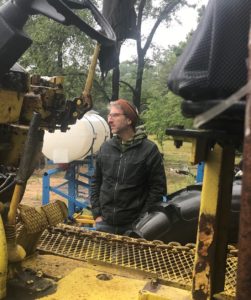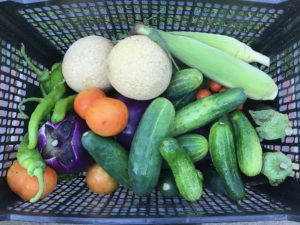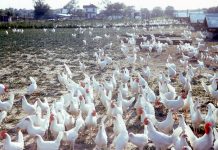William Levin’s great-great-grandfather Moses Bayuk, along with 42 other Russian Jewish families, settled on the patch of land in Vineland, New Jersey, in 1882, turning to subsistence farming in the United States after fleeing the pogroms in Russia, though they had little experience farming.

In 2014, more than 130 years after Levin’s family settled on the land, Levin’s father was getting ready to sell it. Levin and his wife Malya, both of whom had recently become involved in the Jewish farming movement, bought family members’ land shares and, in 2016, began Alliance Community Reboot, reviving the farming roots of Bayuk’s original settlement of farming Jews: Alliance Colony.
The Levins founded ACRe as a “Jewish farming community” in Vineland with the hopes of escaping the stressors of their urban New York lifestyle and reconnecting themselves — and fellow Jews — with the land.
On Aug. 5, ACRe launched its inaugural Community Supported Agriculture program, hoping to share its harvest with locals in South Jersey and Greater Philadelphia.
It hasn’t been an easy road.
“Similar to William’s ancestors, we weren’t farmers,” Malya Levin said.
Malya Levin is a lawyer in Brooklyn advocating for seniors who have experienced elder abuse; William Levin is a cartoonist. (He penned a cartoon for The Jewish Exponent 15 years ago called “Shabot 6000” about a Jewish robot).
The Levins struggled to find the help of local farmers who would help the couple who were so green to farming, especially as they wanted to grow organic crops, which was anomalous among the fields of conventional farming with pesticides and chemical fertilizers in the area.
They eventually found the guidance they were looking for from Joe and his grandson Kenny Bartee, organic farmers from Brotmanville, New Jersey, who were willing to partner with the Levins to help ACRe grow organically.
In June, the Levins held an event on their farm for interested potential donors to see ACRe and meet the Bartees. It was then that the Levins, with the help of friend and journalist Ben Harris — who has a decade of farming under his belt — hatched their CSA plan.
Harris believed that CSAs are a boon for some farmers. During COVID, buying produce from farms was sometimes more reliable and safer than buying from grocery stores.
“When people were afraid to go to supermarkets, there was something nice about having a local farm,” Harris said. “All of a sudden, we recognized how susceptible and vulnerable our food systems truly are.”
Even though the CSA would potentially grow ACRe’s audience, the Levins were underprepared to begin one so quickly.
Most farms begin their CSAs in June, and they run for 16-20 weeks. ACRe just began to organize its 12-week CSA in June.
“To be honest, I don’t think it’s something I felt we were truly ready for,” William Levin said.
And the CSA was a steep investment: The Levins had to buy proper refrigeration units to store and help transport their crops.
Now, even with tomatoes, watermelon, eggplants, corn, squash and more growing abundantly, they are still having trouble drawing an audience.
As of the end of July, ACRe had seven committed customers for their CSA; they hoped to get 30. With the help of several donations, the Levins broke even in their investment, but would still rather share their fruits and vegetables with those interested in building the specific farmer-community relationship CSAs allow.
William Levin said that in South Jersey, lesser-known vegetables like kohlrabi are off-putting to potential CSA-buyers. Generally, CSAs don’t allow their consumers to pick which crops they distribute.

“People wanted to be assured what vegetables they were going to get,” William Levin said. “They didn’t like certain vegetables, and they thought they wouldn’t … be able to cook enough of it. That’s kind of the antithesis of a CSA.”
The Levins hope to find a Philadelphia pick-up location to expand ACRe’s CSA consumer base. In the meantime, they continue to find ways to connect Judaism and agriculture.
ACRe has hosted Shabbatonim, High Holiday services and, recently, a Tu B’Av event for single area Jews. Many of the events are held at the Alliance Synagogue, constructed by Bayuk more than a century ago.
Sean Kashani, who has helped the Levins with CSA distribution, believes that the spiritual connection between farming and Judaism is clear.
“It’s a way to see God’s hand in creation,” he said. “You watch a seed deteriorate underground and, with the right soil and water, it grows into plants or flowers.”
According to Malya Levin, bringing the farm back to life meant not only connecting with other Jews, but connecting their three young children back to the land on which William Levin’s family had built their home.
“Celebrating with them, in the shadow of these buildings and locations that their ancestors lived and worshipped on, has created this new feeling of a Judaism that’s rooted in a place in a way that I never experienced,” Malya Levin said.
Information and registration for ACRe’s CSA can be found at csa.acreboot.org/.
[email protected]; 215-832-0741





